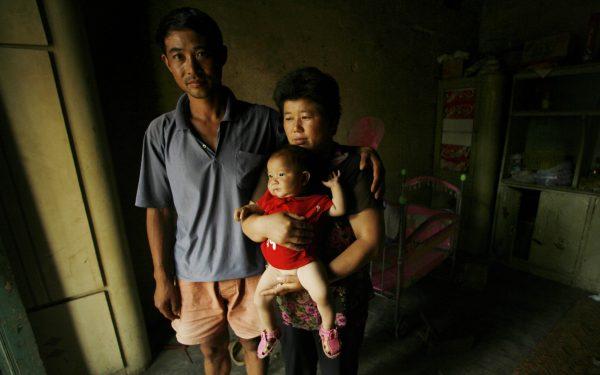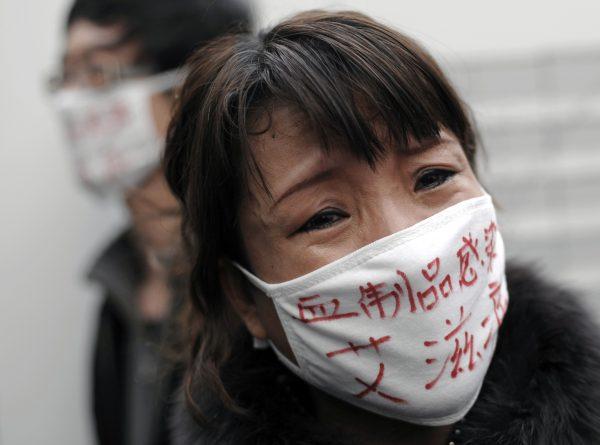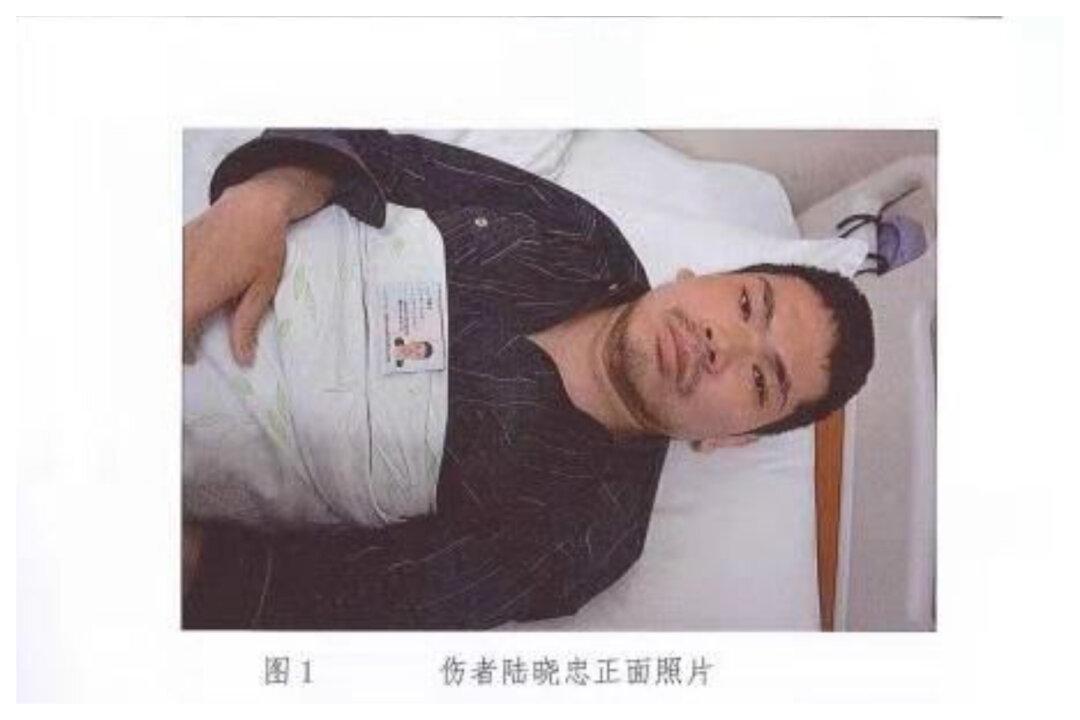Lu Xiaozhong, a hemophiliac, contracted HIV and Hepatitis C from the contaminated clotting factor VIII administered to treat his illness in 2004. Since then, rather than receiving proper treatment and medical assistance, he has been a target of the regime’s repression for more than 19 years.
On March 17, he finally escaped China and made his way to a refugee camp in Frankfurt.
“It’s a miracle that I could survive to this day,” he said to the Chinese language edition of The Epoch Times recently, and he finally found his dignity and joy of life as a human being.
Blood Plasma Economy
Lu, 46, was diagnosed with hemophilia as a child. The illness made him drop out of school in fourth grade.Like many other hemophilia patients who regularly took the Chinese-made clotting factor VIII at that time, he became handicapped by the tainted agent, which led to various complications and generalized joint necrosis, while many others died.
Shanghai Institute of Biological Products (SIBP), a subsidiary of the State-owned pharmaceutical company Sinopharm, produced these agents.

Along with improper blood collection, selling, and transfusion, millions of Chinese became victims of HIV-tainted blood.
In Houyang Village, for instance, 38 percent of babies from AIDS-infected parents born after 1996 had contracted AIDS.
Unfortunately, the bureaucratic connections of the pharmaceuticals have determined the fate of the victims.
The regime adopted its typical suppression measures against the victims who sought relief from the government and the company.
Lu said that even though some lawsuits were filed, no court dared to penalize those who were responsible.
He said, “SIBP’s party secretary was [a] schoolmate of Jiang Zemin [former Chinese leader] ... no one dared to touch the case.”
When Henan was engaged in the plasma economy, the party chief of Henan was Li Changchun, succeeded by Li Keqiang.
Li Changchun moved from a local governor to a Standing Committee member of the Politburo, despite there being a national outcry to hold him accountable for the national disaster.
Li Keqiang also smoothly stepped up in the party hierarchy and became premier.

Locked up and Beaten
Since 2004, Lu has become a target of the regime’s suppression in the name of stability maintenance by the authorities in Suzhou City, south of China.He was kept in Suzhou’s Fifth People’s Hospital.
The day-in and day-out monitoring by the police at the hospital was driving him crazy. He decided to visit the provincial petition office to file a complaint in September 2005. But the police captured him and sent him back to Suzhou.
In an iron fence ward designed for rabies patients, Lu was locked inside with no food and water for three days.
He described his mentality: “At the time, I was naïve and believed that the CCP would eventually save me and understand me.”
But, his experience of petitioning in Beijing woke him up.
In April 2016, he filed a complaint to the petition office of Sinopharm in Beijing, and was only treated with heavy beating by a thug from SIBP, who even broke his crutch.
He called the police and filed a lawsuit in the court.
The police told him they recorded everything and had all the evidence. But, in the trial, they said there was no recording, and Lu did it to himself. He said, “That woke me up.”
He realized that in the eyes of the local authorities, “I was a troublemaker, a parasite,” he said.
On sensitive days, local police would confiscate his ID, cellphone, and permit to Hong Kong and Macau. He would get locked up inside the ward; sometimes, it would last for as long as 30 days.
He said for someone like him, with a terminal illness, the authorities would spend so much effort just to keep an eye on him. There was only one reason: The corrupt officials took him as an excuse to get more reimbursement from the central government.
He gave an example. “The local staff would get rewarded for tens of thousand of yuan if they are able to interrupt and kidnap one local petitioner before he reaches [the] Beijing petition office,” he said.
Depression Has a Cure
In recent years, Lu’s developed depression which became more and more severe, and he wanted to go abroad to get some relief.He needed the authorities’ permission.
He asked the officials to grant his travel to Serbia.
They wanted him to go to Thailand and said: “Why Serbia? There’s a war in Europe. Go to Thailand.” He rejected the idea and insisted on his plan.
Perhaps it’s because of his terrible health condition—he can’t survive without receiving the clotting factor VIII—the authorities did not stop him from booking an airline ticket.
With many obstacles in the airport, the Chinese police finally let him go seeing he’s extremely weak physically. He was lucky to get on board.
In Frankfurt, he did not get on the transit flight to Serbia. Instead, the German police at the airport took a record of him and sent him to a refugee camp, where he was registered as a refugee.
After a week, he was settled in a German hospital with proper care.
After arriving in Germany, he has not had the anti-depressant he brought with him. He said, “It’s been a while. Now I can sleep at night, and the fear is gone.”
He recalled life in China, “It’s a horror. Even if you sleep in the ward, [you’d fear] someone would come in to rob you, or send you to a mental hospital at any time. It’s highly intense, and [...] depressing.”
Now in Germany, he feels the air is sweet and the sky is blue. His body is comforted with the pleasing atmosphere built by people surrounding him. “They’ve been telling me: We are here to help, don’t worry.”
Lu feels that life has finally started for him. He said, “My life prior to this was worse than a dog.”
He’s confident that he’ll gain his health, and when he’s able to take public transportation, he’s ready to visit the Chinese diplomat in Frankfurt, he said.




